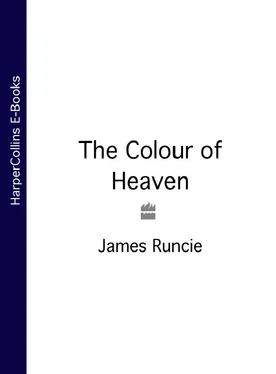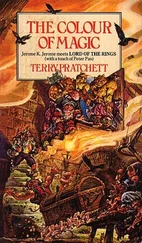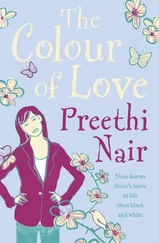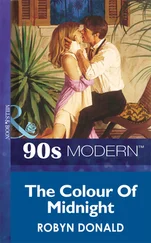‘I do not know,’ Paolo replied. For the first time he was scared of his own mother.
‘We must find eye crystal to make you see,’ Teresa announced. ‘Come now. Let’s go. In the boat.’
‘Now? Without father?’
‘He must not know. I will get a man to take us over the water to the merceria. There are men there who sell lenses that will help you. I only hope we have the money.’
She pulled at his arm and they made their way to the harbour. There they were rowed over to the mainland. Disembarking on the fondamenta, they walked through the narrow lanes of the Castello, where an elderly hunched man was selling glasses from a tray laid out in the corner of a haberdasher’s shop.
Teresa picked at the spectacles so frantically that Paolo thought that she would break them.
‘Here, try these.’ She handed him a pair of twin lenses, joined at the bridge, but without arms.
‘Why are you here?’ said the pedlar.
‘You do not want us to buy your wares?’ Teresa replied abruptly.
‘Yes. But the boy is too young for such things …’
‘He cannot see.’
‘But these are for old men, scholars, those who read …’
Teresa handed Paolo a magnifying glass.
‘Is this better?’
‘No, it makes things more blurred in the distance.’
Paolo tried lens after lens, spectacle after spectacle, holding them up by the arms, amazed by the way in which vision in the right eye and then the left swam before him. The goods in the shop became strangely enlarged, almost threatening. Strips of metal, ribbons, bows, buckles, lengths of hemp and twine, mirrors and their reflections, all combined, glass on glass, reflected and refracted, lurching up to meet him.
Paolo’s head hurt with the confusion. The lenses fought against each other, and he struggled to find focus.
He felt as if he lived inside a cloud.
Each time he picked up a new lens he could sense his mother’s desperate expectation.
‘Hold it at a distance,’ Teresa ordered.
Paolo stretched out his arm and the building across the street suddenly appeared sharp and clear, the windows glinting in the light against pale-pink stone.
‘Now it makes things upside-down,’ said Paolo. ‘I can see clearly but I would need to hold the lens at arm’s length and walk on my hands.’
‘It is meant for close work only,’ said the pedlar.
‘Can you not make such a lens against my eyes, without the world turned round?’
‘What is it that you cannot see?’
‘The distance.’
‘But you can see close?’
‘Clearly. If I look at my finger, I can see the whorls of my skin more distinctly than I can through any glass. Yet nothing else is as true. Everything fades.’
‘Alas,’ said the pedlar. ‘These spectacles are for old men, for scholars, to aid in reading. I have nothing for sight such as yours. The glass cannot be made for such a purpose.’
‘Then what can we do?’ Teresa asked.
‘You could visit Luciano the apothecary. He may have a remedy; but he is not always reliable …’
‘We must go to him now,’ said Teresa, pulling Paolo away, ‘before your father realises, before anyone knows that you cannot see …’
‘I can see.’
‘Not well enough. Marco will be able to tell. We must prevent him knowing of this.’ She called to the pedlar. ‘Goodbye.’
They crossed three streets and made their way to the jewellers’ quarter. Paolo found the busy alleys more frightening than the objects in the shop. He seemed to be permanently in the way of another person, someone with more pressing business. Crowds pushed past. Horses reared up in front of him. The streets stank of excrement. He longed to be home.
Luciano the apothecary worked in a shop crammed with hanging herbs, pottery jars of powders, liquids, and unguents. He sat behind a curtain of bright flame and bubbling amber liquid. A great mortar with a heavy pestle hung from the ceiling, and majolica jars lined the room, holding saffron, pepper, ginger, cinnamon, clove, nutmeg, cassia, and galinga. Every object in the shop appeared to be black, silver, white, or gold; as if this spectrum of colour held a symbolic secret that only the apothecary could fathom. As soon as they entered his laboratory Luciano began to talk of a new alchemical invention which was nothing less than a recipe for everlasting life. It involved mixing the scales of a fish with powdered gold and the eyelid of a snake, and he was convinced of its efficacy.
Teresa interrupted. ‘My son cannot see.’
The apothecary put down his tools. ‘He is blind?’
‘No, but he cannot tell distance.’
‘That is common enough.’
‘It may be so, but then he cannot work at my husband’s craft.’
Luciano turned to the child. His eyes were sunk deep in his head, as if he himself had trouble with sight. Now he came close, looking hard at Paolo.
‘How old are you?’
‘I am twelve.’
‘Is the light too bright for you?’
‘Not here, no.’
‘Where? When?’
‘In the heat of the day. The brightness …’
‘Is it too strong?’
‘Sometimes it hurts my eyes.’
‘I understand. Come. Stand in the doorway.’ The apothecary put his arm around Paolo’s shoulder.
‘Look out into the street now. What do you see?’
‘I see shape, not detail. Colour, not form.’
‘You live, perhaps, in a clouded world?’
‘Sometimes I cannot see the clouds. People tell me they are there, or that a storm is coming, but I am unable to perceive such things. Such forms are like sheets of white across the sky, darkening slowly and then becoming black. I see them move but they are as mists.’
The apothecary told Paolo that sight was a dance of two rays, perpetually changing, between perception and object. The eye was filled with seeing and the object was luminous with colour. Paolo’s problem was that his eyes lacked sufficient power.
‘Do you eat many onions?’ Luciano asked suddenly.
‘No,’ replied Paolo.
‘Of course you eat onions,’ said Teresa.
‘Yes, but I don’t like them.’
‘Falconers find their sight improves if they forgo onions. Have you tried balms and ointments?’
Paolo knew nothing of such things. He was silent. Teresa attempted to explain.
‘He has sought no cure. The lack of sight is new to him.’
The apothecary sighed, leaned forward, and held up a candle.
‘Come here, my child. Look into this light.’
It was held so close and became so bright that Paolo flinched. Luciano came as near as possible, and looked hard into each eye. His breath smelled of tomatoes.
‘Let me think,’ he said.
‘Surely we need a balm,’ said Teresa, ‘a potion, a tincture, or an ointment? Something we can put on his eyes to make them well.’
Luciano confessed that there were such treatments but he had still to be convinced of their efficacy. He had heard how celandine, fennel, endive, betany, and rue could all help restore eyesight; as well as pimpernel, ewe’s milk, red snails, hog’s grease, and the powdered head of a bat. Some recommended the application of leeches to the eyelids, and he had learned that a doctor in Padua had recently suggested that those with weaknesses of the optic spirit might gain comfort from hanging the eyes of a cow round their neck. He had studied recipes that involved the venom of toads, the slaver of a mad dog, wolfsbane, aconite tubers, and the burned skin of a tarantula.
After some thought he suggested that he try a balm he had made from mixing eyebright with white wine, distilled until it was ready to drink. Two handfuls of herbs were mixed with hog’s grease and beaten with a pestle and mortar. This thick ointment had been left in the sun for three days, boiled, strained, and pressed three times before it was ready to coat the eyes.
Читать дальше











